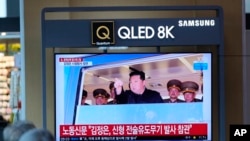North Korean leader Kim Jong Un observed the test-firing of an apparently nuclear-capable “new-type tactical guided weapon,” state media reported Sunday, the latest in a series of provocative launches by Pyongyang.
The state-run Rodong Sinmun newspaper posted pictures of the apparently short-range weapon emerging from a mobile launch vehicle parked on a beach, as Kim observed, apparently from an observation vehicle parked nearby.
The weapon “is of great significance in radically increasing the fire striking power of the long-range artillery units on the front and strengthening the effectiveness of tactical nuclear operation of the DPRK and diversification of the firepower task,” the report said, using an abbreviation for North Korea’s official name.
Based on that description, analysts said the rocket appears meant to deliver tactical nuclear weapons, an attempt to fulfill one of several key military modernization goals laid out by Kim in a speech last year.
The rocket appears visually similar to the KN-23 and KN-24, two short-range North Korean ballistic missiles first tested in 2019, said Ankit Panda, a nuclear policy specialist at the Carnegie Endowment for International Peace.
“All three could serve as a tactical nuclear weapons delivery system if they so chose. I'm not sure why they'd introduce yet another new short-range missile type specifically (for) this role,” Panda told VOA.
South Korea’s military on Sunday said the North Korean launch involved two projectiles, which were fired about 6 p.m. local time Saturday. The projectiles, it said, flew a distance of about 110 kilometers at an altitude of about 25 kilometers – much shorter than even North Korea’s recent short-range launches.
It is not clear why the North and South Korean accounts differed regarding the number of weapons fired.
North Korea has conducted multiple tests of intercontinental ballistic missiles that could likely reach the U.S. mainland. Its latest such test occurred last month.
But the North also seeks the capability to deliver smaller nuclear weapons at shorter distances, which would pose a major threat to U.S. allies South Korea and Japan.
North Korea has for months ratcheted up tensions with the United States. Many analysts expected the North to conduct a major weapons test around this week, while the country celebrates the birth anniversary of the country’s founding leader, Kim Il Sung.
State media did not say when the latest launch occurred. South Korea’s military also did not issue its typical real-time missile launch alert to reporters – although sometimes Seoul does not issue such alerts for smaller launches.
The first sign of a launch came early Sunday, when authorities on the U.S. Pacific island of Guam released a statement saying there was “no indication” that a “reported launch” from North Korea posed a threat to the island.
The statement raised eyebrows, since at that point, there had been no reports of a North Korean launch.
So far this year, North Korea has conducted at least 14 rounds of launches. Last month, it conducted its first ICBM test since 2017. U.S. officials have warned the North could soon conduct another nuclear test.
As North Korea tests bigger weapons, the U.S. and its allies are also ramping up their displays of military strength. Last week, a U.S. aircraft carrier strike group entered international waters near South Korea for the first time since 2017. The U.S. and South Korea are also set to hold major joint military drills later this month.
The military exercises will likely involve bigger weapons and more personnel than in recent years, some analysts predict. Since 2018, the two allies have scaled back or spread out joint drills to preserve the chances for diplomacy and because of the coronavirus pandemic.
“It is highly likely that both sides will agree to restore the annual joint military exercises to previous levels,” said Bong Young-shik with Yonsei University's Institute for North Korean Studies. “Why continue (scaling down the exercises) if it has been proven not effective at all in terms of pacifying North Korea’s behavior?”
Meanwhile, North Korea has rejected invitations by U.S. officials to resume nuclear talks. Negotiations between Kim and former U.S. President Donald Trump broke down in 2019 over disagreements on how to pace sanctions relief with steps to dismantle North Korea’s nuclear program.




